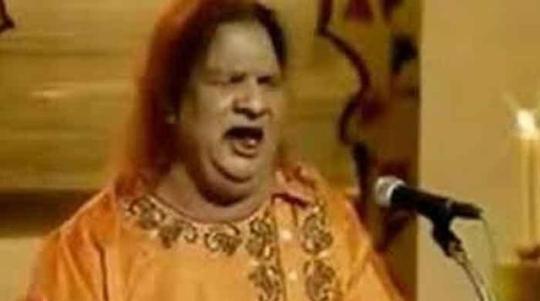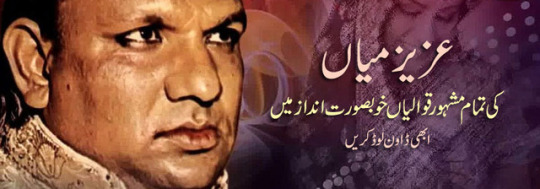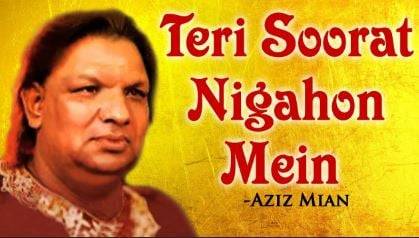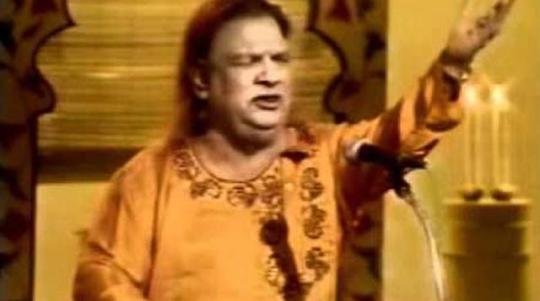#aziz mian qawwal
Explore tagged Tumblr posts
Text
Aziz Mian Qawwal and Sons [Imran Aziz Mian and Tabrez Aziz Mian Qawwal]
Aziz Mian Qawwal and Sons [Imran Aziz Mian and Tabrez Aziz Mian Qawwal]
Aziz Mian Qawwal is being regarded as one of the most popular Qawwali artists of the sub-continent. With his unique style, he amused and mesmerized audiences at the same time. He was awarded Pakistan’s greatest award for performing arts, the Pride of Performance in 1989. Aziz Mian left 2 talented sons: Tabrez Aziz Mian Qawwal and Imran Aziz Mian Qawwal, who continue here legacy. Download there…
View On WordPress
1 note
·
View note
Text
آپ سے ایک بات کہنی ہے
چھوڑیئے خیر کوئی بات نہیں
Need to say something to you... never mind it’s ok
- Aziz Mian Qawwal
23 notes
·
View notes
Photo

Aziz Mian Qawwal remembered on his birth anniversary ISLAMABAD: The legendary traditional singer Aziz Mian Qawwal was commemorated on Wednesday in his birthday on the occasion of his 78-year anniversary.
0 notes
Photo

Listen qawwalis of famous qawwal Aziz Mian
1 note
·
View note
Link
#aziz mian#aziz mian qawwalis#qawwalis of aziz mian#qawwalian#aziz mian qawwal#qawwali shrine#qawwali soul
0 notes
Text
Manqabat | Manqabat Poetry-Urdu Manqabat 2021 | Adeel Zaidi
MANQABAT
A Manqabat is a Sufi devotional poem which is written in praise of Imam Ali Ibne Abi Talib, the son in law of Prophet Muhammad or a Sufi saint. There were many poets in Islamic History who have written a lot in praise of Imam Ali in their poems.
Manqabat is also a part of poetry. The Manqabat prose is implicitly understood to be spiritual in its meaning, even though the lyrics can sometimes sound wildly secular or outright devotional. The central themes of Manqabat are love, devotion and praise of holy saint.
It is one of the forms of Qawwali. It is performed mainly at Sufi shrines or Dargahs. It was basically sung in South Asia but has gained global popularity now. Manqabat have received an international appeal from many of famous Urdu poets and singers.
In Qawwali, Manqabat is sung to music. The most well known of the Qawwalli manqabat is “man kunto maula” which is written by Amir Khusrau in praise of Imam Ali. This Manqabat has been performed by many famous singers and Qawwals including Nusrat Fateh Ali Khan, Sabri Brothers, Aziz Mian, Abida Parveen, Fareed Avaz and Qawwal Bahauddin.Best Manqabat Poetry
Manqabat poetry for characteristics is a song in praise of either Imam Ali or one of the Sufi saints. Manqabats in praise of Ali are sung in both muslim communities. It has become the part of both Shais and Sunnis religious gatherings.
Manqabat is also a Praise of the Peer if the performance is at an Urs ,a religious gathering. Qawwals sing very loudly and forcefully, which allows them to extend their chest voice to much higher frequencies than those used in Western singing, even though this usually causes a more noisy or strained sound th
0 notes
Photo

For Watching and Listening All Famous Qawalis Of Famous Qawal Download This App Right now.
#qawwali'#kalam qawali#qawwali#nusrat qawali#qawali nusrat fateh ali khan#qawali app#qawali_of_nusrat_fateh_ali_khan#qawalies#kalam#sufi klam#sufiyana klam#sufis#Aziz Mian Qawwalis#amjad sabri#amjad sabri qawwali#sabri brothers#sabri qawwal#tajdar e haram atif aslam video#tajdar e harm qawwali#tajdar e haram naat#tajdar_e_haram#tajdar e haram#rahat fateh ali khan#nusrat fateh ali khan#nusrat fateh ali khan qawwali
0 notes
Text
Aziz Mian
Aziz Mian Qawwal (April 17, 1942 – December 6, 2000) was one of Pakistan's leading traditional qawwals and also famous for singing ghazals in a unique style of qawwali. Aziz is still one of the most popular qawwals of South Asia. He is responsible for the longest commercially released qawwali, Hashr Ke Roz Yeh Poochhunga, which runs slightly over 115 minutes.
Early life and background
Aziz Mian was born as Abdul Aziz in Delhi, British India. The exclamation Mian, which he often used in his qawwalis, became part of his stage name. He began to introduce himself as Aziz Mian Mairthi. The word Mairthi refers to Meerut, a city in northern India, from which he migrated to Pakistan in 1947.
At the age of ten, he began learning the art of Qawwali under the tutelage of Ustad Abdul Wahid Khan. He received sixteen years of training at the Data Ganj Baksh School of Lahore, and obtained a degree in Urdu literature,A degree in Arabic and another degree in Persian from the University of Punjab, Lahore.
Career
Aziz Mian was one of the more traditional Pakistani Qawwals. His voice was raspy and powerful. Aziz Mian was the only prominent qawwal[citation needed] to write his own lyrics (though, like others, he also performed songs written by other poets).
His break-out performance was in 1966, when he performed before the Shah of Iran, Mohammad Reza Pahlavi. He won first prize and a gold medal from the Shah of Iran. In the early days of his career, he was nicknamed Fauji Qawwal (meaning "Military Qawwal") because most of his early stage-performances were in military barracks for army personnel. He was known for a "more recitative, more dramatic diction" and inclined toward qawwali's religious rather than entertainment qualities, though he also enjoyed success in more romantic qawwals.
For his service in philosophy and music, the Government of Pakistan awarded him the Pride of Performance medal in 1989. He was fond of discussing religious and Sufi paradoxes in his qawwalis. He directly addressed Allah and complained about the misery of man (the greatest creation of the Almighty). In addition to his own poetry, Aziz Mian performed poetry by Allama Iqbal, and a number of contemporary Urdu poets, including Sadiq and Qateel Shifai.
Selected Lyrics
The aim of these extracts to give a flavor of Aziz Mian's hair. Note the tone of irreverent dealt with spiritual matters. As is traditional in qawwali Aziz Mian also wrote songs in praise of the joys of drink. These songs embody a metaphor extended, where the "wine" is a "divine knowledge" and "Saki" (saaqi) is God or spiritual guide, and "bar" is where metaphorical terms may be of the spirit (or may not) be lucky enough to achieve spiritual enlightenment. Similarly, the songs are romantic spirit, and abandoned in this world through this cruel beloved, Persia, and God, and singing from the scourge of separation, and depth of the yearning for reunion.
A qawwali show traditionally begins and ends with devotional songs but in between there is scope for improvisation and here Aziz Mian comes into his own. No simple praise-singer, he explores contradictions and dilemmas -’v hen you hear that staccato rap and see his finger dart back and forth from side to side, again and again, he is asking “which way shall I go?” He is a sophisticated philosopher versed in Arabic and Persian as well as Urdu, who challenges preconceptions and orthodoxy. He sings Hindu as well as Muslim songs and ferociously demolishes sectarianism. Insan azim hai -’man is great’ -is his motto. He is a demolisher of walls, a voice of humanism.
Aziz Mian’s first big break-in performance~ came in 1966 when he performed. before the Shah of Iran ,Raza Shah Pehlvl. He won 1st Prize In Iran and Gold Medal from the King of Persia. Aziz Mian does not reference books while performing and has complete command of the Urdu language and Urdu Literature. For his service in Philosophy, Music and Qawwali, the Government of Pakistan awarded him the highest honour in such categories, the “Pride of Performance” in 1989. He has won almost every award in the field of Qawwali in Pakistan and India. Aziz Mian is not only a great Qawwal but also a devoted Sufi, beautiful poet, philosopher, writer of Serat, Scholar of scripture and a great researcher.
0 notes
Text
Aziz Mian Qawwal
Aziz Mian Qawwal (Urdu: عزیز میاں قوال) (April 17, 1942 – December 6, 2000) was one of Pakistan's leading[1] traditional qawwals and also famous for singing ghazals in a unique style of qawwali. Aziz is still one of the most popular qawwals of South Asia. He is responsible for the longest commercially released qawwali, Hashr Ke Roz Yeh Poochhunga, which runs slightly over 115 minutes.
Early life and background
Aziz Mian was born as Abdul Aziz (Urdu: عبد العزیز) in Delhi, British India. The exclamation Mian, which he often used in his qawwalis, became part of his stage name. He began to introduce himself as Aziz Mian Mairthi. The word Mairthi refers to Meerut, a city in northern India, from which he migrated to Pakistan in 1947.
At the age of ten, he began learning the art of Qawwali under the tutelage of Ustad Abdul Wahid Khan. He received sixteen years of training at the Data Ganj Baksh School of Lahore, and earned degrees in Urdu literature, Arabic and Persian from the University of Punjab, Lahore.
Career
Aziz Mian was one of the more traditional Pakistani Qawwals. His voice was raspy and powerful. Aziz Mian was the only prominent qawwal[citation needed] to write his own lyrics (though, like others, he also performed songs written by other poets).
His break-out performance was in 1966, when he performed before the Shah of Iran, Mohammad Reza Pahlavi. He won first prize and a gold medal from the Shah of Iran. In the early days of his career, he was nicknamed Fauji Qawwal (Urdu: فوجی قوال) (meaning "Military Qawwal") because most of his early stage-performances were in military barracks for army personnel. He was known for a "more recitative, more dramatic diction" and inclined toward qawwali's religious rather than entertainment qualities,[2] though he also enjoyed success in more romantic qawwals.
For his service in philosophy and music, the Government of Pakistan awarded him the Pride of Performance medal in 1989.
He was fond of discussing religious and Sufi paradoxes in his qawwalis. He directly addressed Allah and complained about the misery of man (the greatest creation of the Almighty). In addition to his own poetry, Aziz Mian performed poetry by Allama Iqbal, and a number of contemporary Urdu poets, including Sadiq and Qateel Shifai.
#Urdu#University of Punjab#Qawwali#Qateel Shifai#Pride of Performance#Pakistan#Mohammad Reza Pahlavi#Aziz Mian
0 notes
Text
Aziz Mian
Aziz Mian Qawwal (April 17, 1942 – December 6, 2000) was one of Pakistan's leading traditional qawwals and also famous for singing ghazals in a unique style of qawwali. Aziz is still one of the most popular qawwals of South Asia. He is responsible for the longest commercially released qawwali, Hashr Ke Roz Yeh Poochhunga, which runs slightly over 115 minutes.
Early life and background
Aziz Mian was born as Abdul Aziz in Delhi, British India. The exclamation Mian, which he often used in his qawwalis, became part of his stage name. He began to introduce himself as Aziz Mian Mairthi. The word Mairthi refers to Meerut, a city in northern India, from which he migrated to Pakistan in 1947.
At the age of ten, he began learning the art of Qawwali under the tutelage of Ustad Abdul Wahid Khan. He received sixteen years of training at the Data Ganj Baksh School of Lahore, and obtained a degree in Urdu literature,A degree in Arabic and another degree in Persian from the University of Punjab, Lahore.
Career
Aziz Mian was one of the more traditional Pakistani Qawwals. His voice was raspy and powerful. Aziz Mian was the only prominent qawwal[citation needed] to write his own lyrics (though, like others, he also performed songs written by other poets).
His break-out performance was in 1966, when he performed before the Shah of Iran, Mohammad Reza Pahlavi. He won first prize and a gold medal from the Shah of Iran. In the early days of his career, he was nicknamed Fauji Qawwal (meaning "Military Qawwal") because most of his early stage-performances were in military barracks for army personnel. He was known for a "more recitative, more dramatic diction" and inclined toward qawwali's religious rather than entertainment qualities, though he also enjoyed success in more romantic qawwals.
For his service in philosophy and music, the Government of Pakistan awarded him the Pride of Performance medal in 1989. He was fond of discussing religious and Sufi paradoxes in his qawwalis. He directly addressed Allah and complained about the misery of man (the greatest creation of the Almighty). In addition to his own poetry, Aziz Mian performed poetry by Allama Iqbal, and a number of contemporary Urdu poets, including Sadiq and Qateel Shifai.
Selected Lyrics
The aim of these extracts to give a flavor of Aziz Mian's hair. Note the tone of irreverent dealt with spiritual matters. As is traditional in qawwali Aziz Mian also wrote songs in praise of the joys of drink. These songs embody a metaphor extended, where the "wine" is a "divine knowledge" and "Saki" (saaqi) is God or spiritual guide, and "bar" is where metaphorical terms may be of the spirit (or may not) be lucky enough to achieve spiritual enlightenment. Similarly, the songs are romantic spirit, and abandoned in this world through this cruel beloved, Persia, and God, and singing from the scourge of separation, and depth of the yearning for reunion.
A qawwali show traditionally begins and ends with devotional songs but in between there is scope for improvisation and here Aziz Mian comes into his own. No simple praise-singer, he explores contradictions and dilemmas -’v hen you hear that staccato rap and see his finger dart back and forth from side to side, again and again, he is asking “which way shall I go?” He is a sophisticated philosopher versed in Arabic and Persian as well as Urdu, who challenges preconceptions and orthodoxy. He sings Hindu as well as Muslim songs and ferociously demolishes sectarianism. Insan azim hai -’man is great’ -is his motto. He is a demolisher of walls, a voice of humanism.
Aziz Mian’s first big break-in performance~ came in 1966 when he performed. before the Shah of Iran ,Raza Shah Pehlvl. He won 1st Prize In Iran and Gold Medal from the King of Persia. Aziz Mian does not reference books while performing and has complete command of the Urdu language and Urdu Literature. For his service in Philosophy, Music and Qawwali, the Government of Pakistan awarded him the highest honour in such categories, the “Pride of Performance” in 1989. He has won almost every award in the field of Qawwali in Pakistan and India. Aziz Mian is not only a great Qawwal but also a devoted Sufi, beautiful poet, philosopher, writer of Serat, Scholar of scripture and a great researcher.
0 notes
Photo

Aziz Mian Qawwal is considered a legendary qawwal due to his unique style and the way he connected with audiences. He was wild on stage and his energy was contagious. Download the best Collection of Aziz Mian Qawwalis at Aziz Mian – Main To Diwana Khwaja Ka Diwana (25:44) Allah Hi Janay Kaun Bashar Hai – Aziz Mian Qawwal (31:04) Baksh Detaa To Baat Hoti – Aziz Mian Qawwal (15:29) Nabi Nabi Ya Nabi – Aziz Mian Qawwal (29:08) Qalandar Mast Qalandar – Aziz Mian Qawwal (30:17) Teri Soorat Nigahon Mein – Aziz Mian Qawwal (30:53) Yeh Hai Maikada – Aziz Mian Qawwal (30:02) https://ift.tt/346f47o https://ift.tt/2T2JeCn
2 notes
·
View notes
Video
youtube
Aziz Mian Qawwal - Mohammad Jab Se Hain Mere Dil Main
0 notes
Video
youtube
Liked on YouTube: aziz mian qawwal live Kotli roli Azad Kashmir 1991 https://youtu.be/n9FaQ63xY5Y
0 notes
Link
Click to listen qawwalis
0 notes
Link
#qawwalis#qawwali#aziz mian#aziz mian qawwalis#qawwalian#aziz mian qawwa#islam#muslims#quran#naats#aziz mian qawwal#sufism#sufi qawwal aziz mian
0 notes
Photo

In memory of legendary qawwal Aziz Mian http://ift.tt/2AfTgsG
0 notes